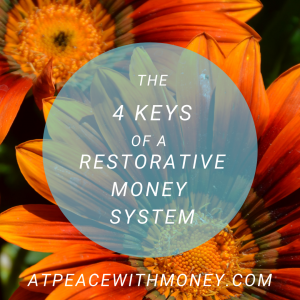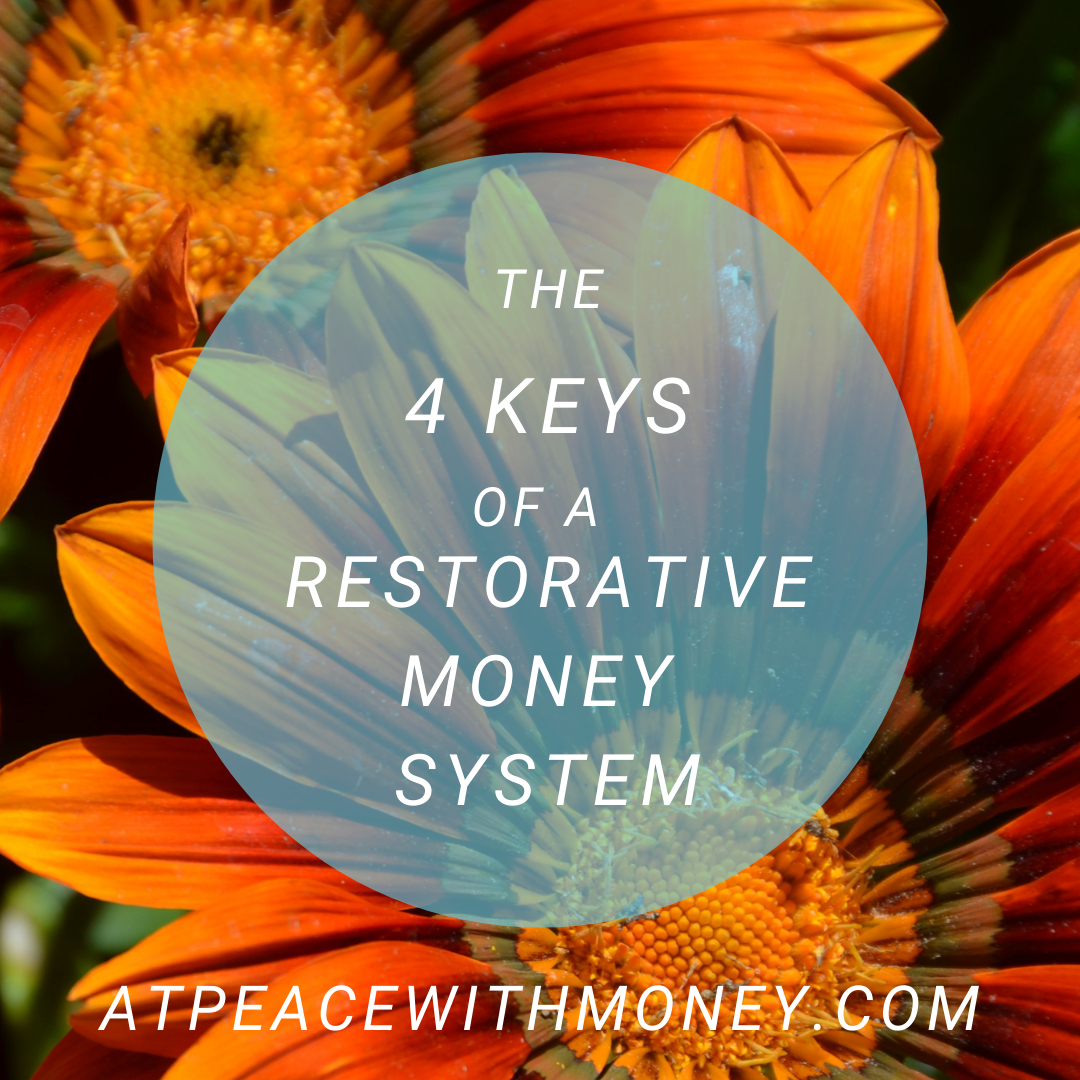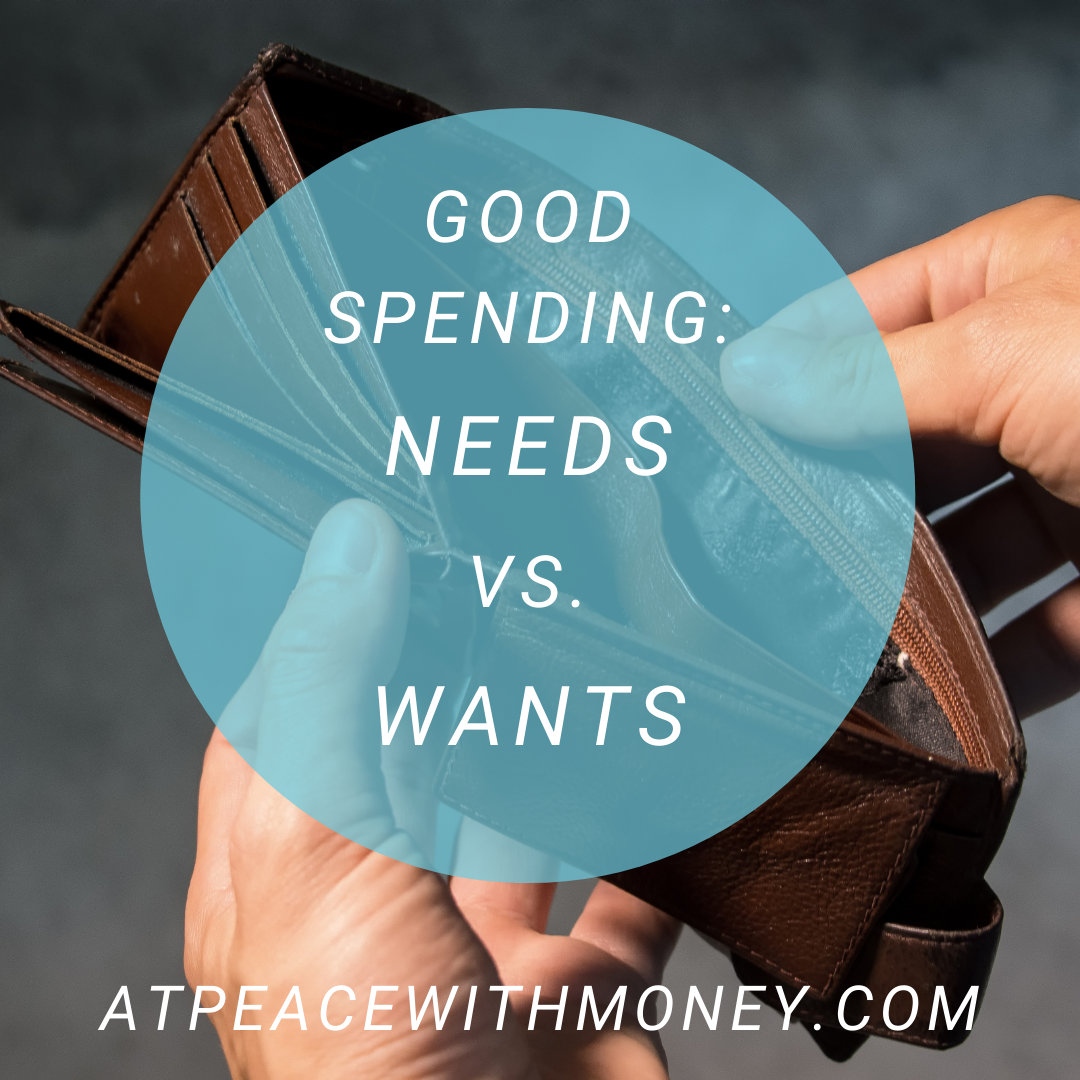The 4 Components of a Restorative Money System

The purpose of your money system is to help you meet your financial needs and keep things organized. A good money system is financially and emotionally restorative. It helps you keep your money going where it needs to go, and it keeps you from stressing. It helps you integrate your personal and business finances seamlessly and without worry. There are many different mechanisms to a money system that help us achieve these objectives. Today, let’s talk about the 4 key ones:
A Spending Plan Aligned with Your Values
Having a clear spending plan that helps you align your expenses with what you care about most is an essential part of a restorative money system. Take the time to assess what you value most in your life, what feels best to spend money on. Oftentimes, there are things we’re paying for regularly that we don’t really value, or that don’t add value to our lives. Discerning the underlying desire beneath your expenses can help you better define your values. For more thoughts on this concept, I recommend reading
The Soul of Money by Lynn Twist.
Once you’ve assessed your values, it becomes easy to cull what doesn’t truly align with you from your spending. From there, you can make the moves to create a spending plan that will keep you on track financially, and in alignment emotionally.
Clear Income Target
Another wonderful thing about creating a spending plan is that going through the process means you get a good idea of what your monthly cost of living is. This means that you have what you need to create a clear income target for your business that corresponds to your tangible needs. Having an income target grounded in your financial needs and goals is a restorative element of your money system because it keeps you in touch with your reasons for putting in the work to take care of yourself financially and run your business. It’s much more powerful than the grand-but-vague “have a 10K month!” approach, because it’s personalized. Your income target reflects the amount of money you need and the amount of work you need to do to live a life aligned with your values.

Your Money Why
Absolutely key to a money system that seeks to restore and enrich your life, your money why is the purpose of your income. This is especially important for business owners, because whether your business is your side-hustle or your full-time income, your income needs a purpose. Vague goals like, “make extra money” tend to have vague outcomes. Your money why is a clear goal or intention you plan on using your income for. After thinking about your values and desires, identifying your money why is simple. For example, maybe you value adventure above all else, and you want your business to make enough to support you and pay for a grand cross-country trip. One of my values is family, and I started my business to support my daughters as they went through college.
Your money why is connected to your values, but it’s goal-based. It ensures that you have a goal connected to your money system that will lead to fulfillment and financial growth. It could be paying off debt, a big purchase, or supporting your family. Whatever it is, your money why keeps you focused and helps you create a good life for yourself.
All Needs Met – Especially Yours
A restorative money system helps you stay organized and save to meet needs – yours and your business’s. This means having a system that helps you save for taxes, pay operating expenses for your business, and pay periodic expenses in both your business and personal life. A restorative money system also prioritizes its creator – you. Your money system should not only account for those important expenses, it should also provide a regular paycheck for you as the owner of your business, even if you have fluctuating income. My ideas around this aspect of a money system are based on Profit First. This system also calls for a way to collect a portion of your income as profit, and distribute it to you, the owner, as a reward for your hard work every financial quarter.
If you enjoyed these ideas about a restorative money system, you will probably also like my series on money-mapping. Here’s part 1, part 2, and part 3 of that series. If setting up a system sounds like the thing to do right now, but you’d like to work with an expert accountability partner, check out my offering, 4 Week Refresh, which is designed to help business owners review 2020 and plan for 2021 from a systems perspective. I’m offering this through the end of January and I invite you to join me!
Angela







 You may have some idea of whether you fit into either category. If you’re not sure what over-saving is, I recommend
You may have some idea of whether you fit into either category. If you’re not sure what over-saving is, I recommend 


 A couple pointers for inspiration: if you feel like you’re not getting paid enough, check out my article on
A couple pointers for inspiration: if you feel like you’re not getting paid enough, check out my article on